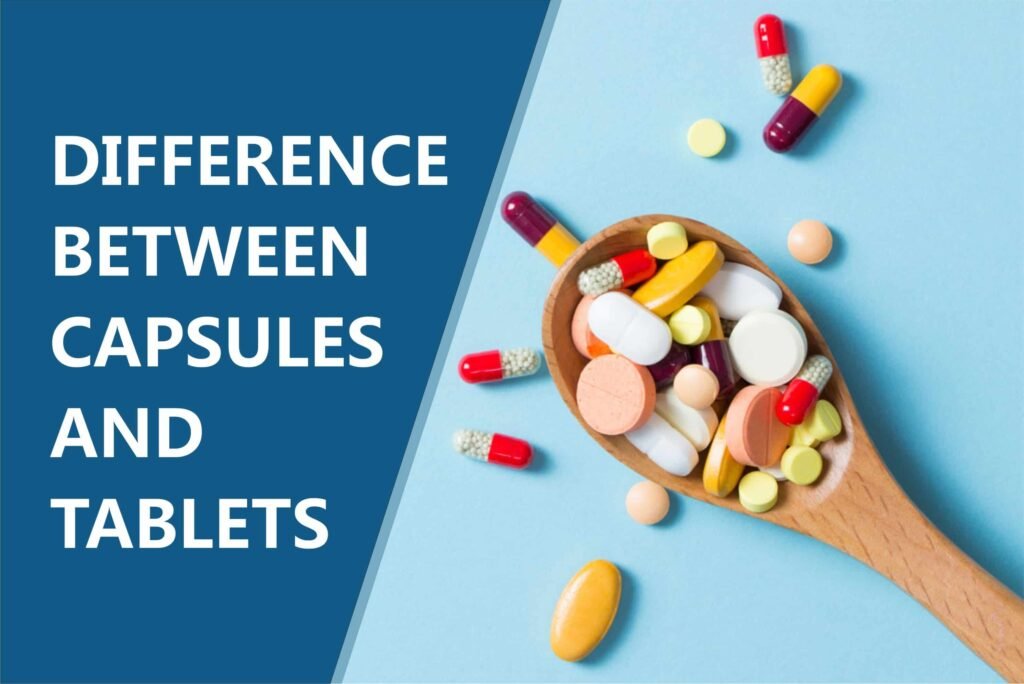
To a layperson, capsules and tables may seem very similar with no reason to distinguish between them. After all, they are both pills that have to be taken orally. Right? Yet, they are two very different kinds of medications, and the reader must be aware of the difference before taking either of them. This article will discuss this distinction and why it is so important to know the difference in detail.
While tablets and capsules are both medicinal pills that have to be taken orally and must pass through the digestive tract before they start acting, there are several differences between the two and how the two of them work. There may also be a massive difference in their prices. In this article will look into these distinctions.
A tablet is entirely made of medicinal chemicals, and it can be crushed and thus consumed in fractional doses.
A capsule is a medicinal chemical contained in a shell, and thus it is not entirely the medicinal shell. Moreover, one can not consume it in fractional doses.
A capsule will start working very fast, while the system must first digest a tablet before it begins working.
Tablets tend to have a long shelf life, while capsules tend to have a relatively more minor shelf life as they tend to react to sunlight and humidity in the air.
Most tablets tend to have a most unpleasant taste. A capsule, on the other hand, is tasteless.
A tablet can combine in various doses, while the amounts of quantities are limited in the case of capsules.
Soft-shell capsules often contain an animal product, making them undesirable for people following certain lie styles – such as vegetarians or vegan people. Many tablets contain a chemical called gelatin, and it is sourced from pigs, cows, or fish, which may make such capsules unsuitable for vegetarians and vegans.
Some tablets are meant to be consumed to enhance their digestibility. Capsules are never consumable, and they need not be as the body readily absorbs them without chewing.
Tables can be split into fractions, and some tables even have lines to help do the splits. Capsules can not split.
Tables can also be unpredictable as one can not be sure if they will break down as expected. On the other hand, one can be confident about how the capsules will work.
Tables are uniformly solid in composition, while tablets may sometimes have liquid constituents. Such capsules usually are hard-shelled. These hard-shelled capsules, which contain medication in liquid form, are known as liquid-filled hard capsules (LFHC).
Compared with capsules, tables are way more likely to irritate the gastrointestinal tract.
While tablets are splittable, it may be easy for people to tamper with them. Capsules are so made that they can’t be easily broken or split without destroying the whole thing. Thus capsules make it easy to ensure that prescriptions are followed as prescribed.
One can classify tables according to the kind of shapes they come in – round, oblong, etc.
Capsules can be categorized into soft-shelled capsules and hard-shelled capsules. Generally, hard-shelled capsules may contain powdered medication, though occasionally they contain liquid medicines. Soft-shelled capsules are likely to contain gelatin and liquid drug, like in the case of “liquids.”
For any given medical problem, the desirability and prices of tablets and capsules will vary a lot. And the reader may save a lot of money by exchanging one instead of the other as long as it won’t affect their health.
Question: Is it safe if one were to crush tablets or open capsules?
Answer: There are numerous risks associated with crushing tablets or opening capsules.
It alters how the drug is supposed to be absorbed into one’s body when one does. That can result in not getting enough of the medication or getting too much in other cases.
Some tablets have a special coating that prevents disintegration in the stomach. These might be undesirably speedily absorbed in the stomach if one crushed them, which can lead to under-dosing, among other possible complications.
Overdosing can be more likely with extended-release pills if such pills were tampered with as the active ingredient may be quickly released all at once instead of gradually as it is supposed to happen.
Question: How can I swallow them more easily?
Answer: Many people find swallowing pills uncomfortable, particularly if they have a bitter aftertaste or are too large. Sometimes their shapes also present a challenge. Tablets offer a different kind of challenge as they may be stiff and hard, and there are some large capsules.
That said, the reader can try the following techniques to make it a little easier:
Question: Is one type safer than the other?
Answer: Both tablets and capsules may present minor risks.
Tablets, for example, may contain more ingredients than capsules and thus may potentially increase the likelihood of sensitivity or an allergy.
Capsules also contain additives. Hard-shelled capsules tend to contain fewer extra ingredients, and soft gels generally have a higher number of synthetic ingredients.
The reader should consult a doctor to know which are the best for their use.
From the above discussion, it should be clear to the reader that while one can not change capsules and tablets interchangeably, sometimes switching from one to the other may be better. It is best to consult one’s doctor before making such a change.